UN-HABITAT’s Water for African and Asian Cities Programmes
Experiences with Human Values-based Water and Sanitation Education by Avi Sarkar, UN-HABITAT

Rising population pressures, urbanization and a lifestyle driven by consumerism, have progressively eroded the values that held our societies together

Urban Water and Sanitation Stress: Growing Inequity and Inefficiency
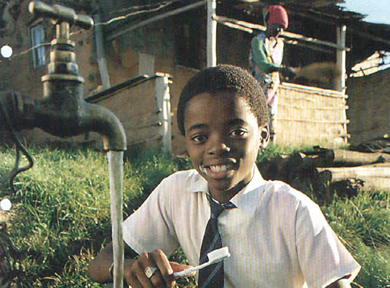
What we need is an attitudinal change that can help develop a new water-use and sanitation-friendly ethic in society, amongst service providers and users.
Children and youth could be the best ambassadors to bring about these attitudinal changes.
Response:
Water, Sanitation and Hygiene Education
But is it enough to result in lasting change?
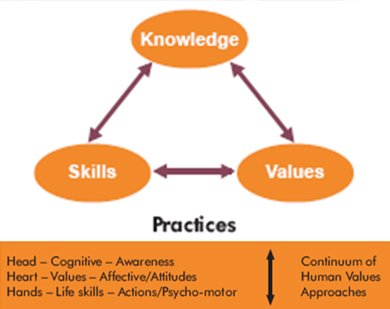
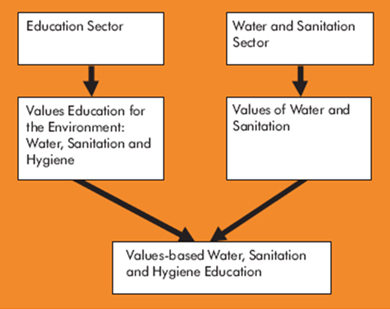
A Social Issue
Lack of safe water and basic sanitation facilities could be life-threatening to all – poor and rich alike. How could water and sanitation be made accessible and affordable to the poor?
Value-based Dilemma
Am I willing to share the cost of providing water to the poor in the slums? This may mean that I will have to pay a higher price for water than I today
Value-based Solution
Yes, I care for my poor neighbour. I am ready to pay a higher price for water when I am convinced this will help extending water supply to poor neighbourhoods. I will afford it by cutting down my entertainment expenses.
Underlying Values: Caring for others; respect for other’s needs
Another Social Issue
How to deal with corruption in daily life which ultimately affects sustainability of services in cities
Value-based Dilemma
Should I pay the high water bills every month or make a deal with the meter reader who offers to under-read it or tamper with it so that I can pay a flat rate that will be less costly to me.
Value-based Solution
Yes, I will pay for the actual cost of water I consume. If I follow Unscrupulous means, this will set a Bad example for my children.
I want to see them grow up as responsible Citizens.
Underlying Values: Truthfulness; honesty; self-respect
A Conservation Issue
How to deal with profligate wastage of water
Value-based Dilemma
I can afford the water bill, but should I stop watering my gardens and washing my cars during summer months when scarcity of water hits the city?
Value-based Solution
Yes, I should take every opportunity to conserve water, even if it means a little inconvenience to me. I have a right to use water but not to abuse it
Underlying Values: Self-discipline; consideration for others
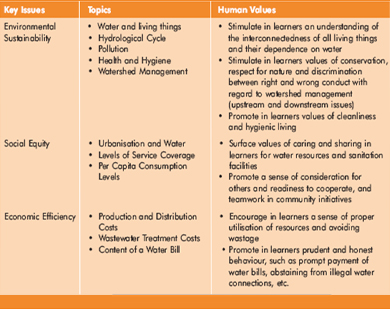
What are Human Values?
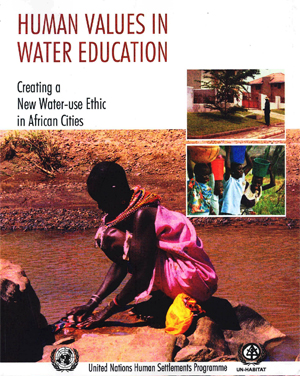
They are those qualities of a human being which are desirable, respected, worthy, esteemed, dominant and which are sanctioned by a given society. They are universal and are the essential foundation for good character.
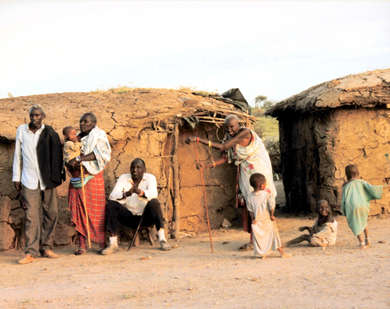
Water, sanitation and hygiene education is embedded in the traditional values of solidarity, respect for nature and shared responsibility in most societies
Human Values and Human Rights: Milennium Project: Page 15: Investing in the Future, 2004
“Expanding access to water and sanitation is a moral and ethical imperative rooted in the cultural and religious traditions of societies around the world and enshrined in international human rights instruments”
Values Elicitation: Journey of Waste Water Drop
Endurance, sharing, caring, teamwork
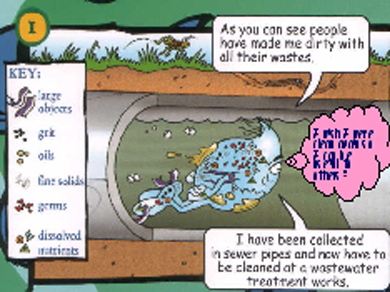
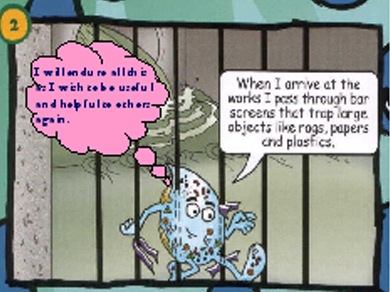
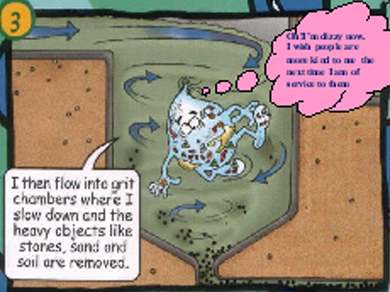
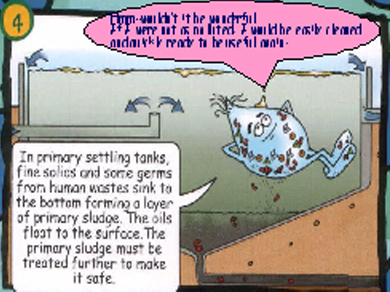

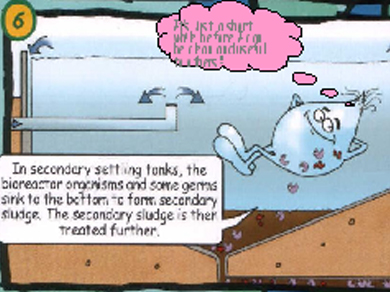
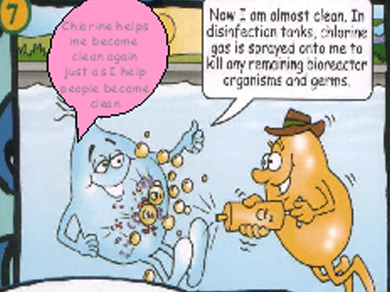
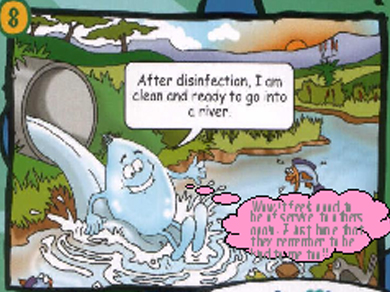
-End-
Water Education: Why do I have to Pay for Water?
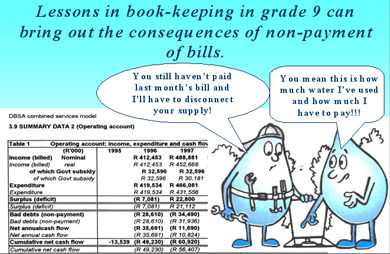
Universal Human Values
truthfulness; discrimination
honesty, shared responsibility
sympathy; tolerance; humanism
self-respect; self-discipline
consideration for others
These values mirror the values enshrined in the UN Charter and the Millennium Declaration:
Freedom, Equality, Solidarity, Tolerance, Respect for nature and Shared responsibility
Concept for Human Values in Water, Sanitation and Hygiene Education (HVWSHE)
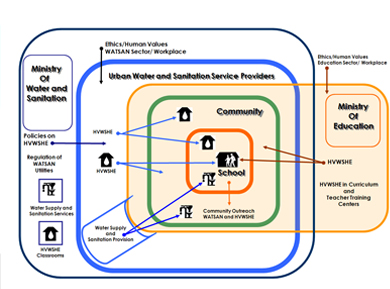
Engage with Policy Makers
Enhancing awareness and political will for values-based water and sanitation education in cities
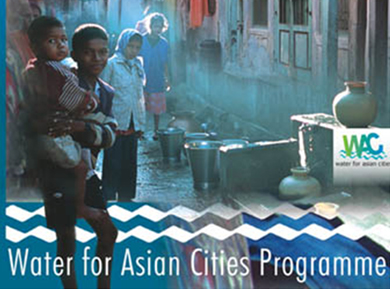
Engage the Education Sector
Building capacity to conduct values-based water and sanitation education in the formaland in-formal education sector:
Promoting value-based water education through the curriculum Developing teacher training guides and conducting training of trainers (Teacher Training Colleges)
Demonstrating value-based water education in selected pilot schools
Engage with the Water and Sanitation Utilities
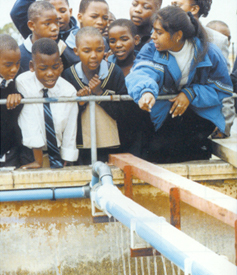
Establishing water and sanitation education class rooms
Water and Sanitation Education teams at Utilities
Values-based Water and Sanitation Education Resource Guides and training
School Water and Sanitation Audits
Water Quality Audits
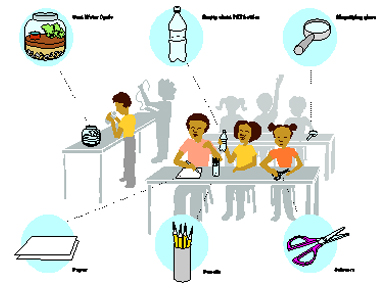
Engage Communities (Non Formal Education)
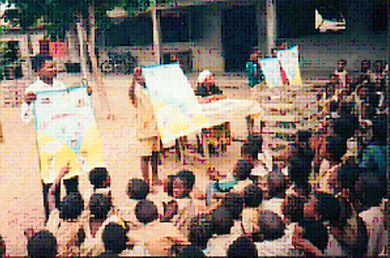
Schools as centres for community initiatives
Distribution of water disinfecting
Community demonstrations
Guide documents for Values-based Non-formal education and capacity building
Twinning of schools within countries and among countries within in the regions and among schools in the North and the South (peer education)
Promoting investments, provision and O&M of water and sanitation in schools through:
Capacity building for delivery and O&M
Disposal option: cloth
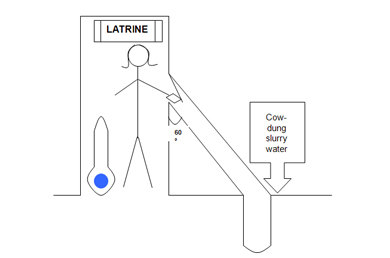
“A steep 60o chute made from a 6” PVC pipe, which leads from a hole in the cubicle wall to a simple unlined pit in the ground outside, separate from the septic tank and covered with a stone slab. Menstrual cloths can be dropped down this chute, and a mug of cow-dung-slurry water, once a week aids decomposition of all the organic waste and controls smell."
Almitra Patel, Bangalore
HVWSHE in Africa
Conceived at EGM in Johannesburg, May 2001
Phase I: 7 countries in Africa 2001 to 2003
External Evaluation 2004
Phase II: 14 countries in Africa 2004 onwards
HVWSHE in Asia
November 2003: Regional Consultations on VBWSE held in Manila
March 2004: 10 ASEAN Ministers Adopt Declaration and Action Plan on VBWSE
Countries: ASEAN, Mekong, India, China, Nepal, Kazakhstan
Human Values: An Innovative Social Engineering Approach to Sustainable Development
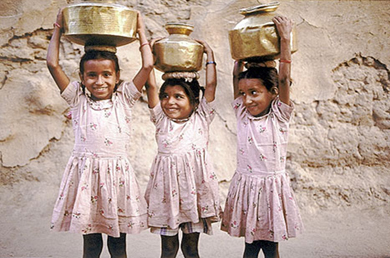
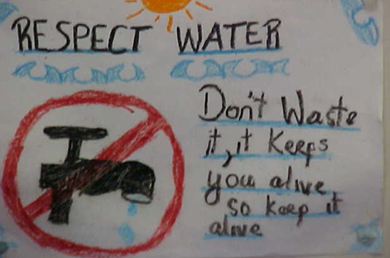
Art done by a Grade 5 learner after the Group discussions